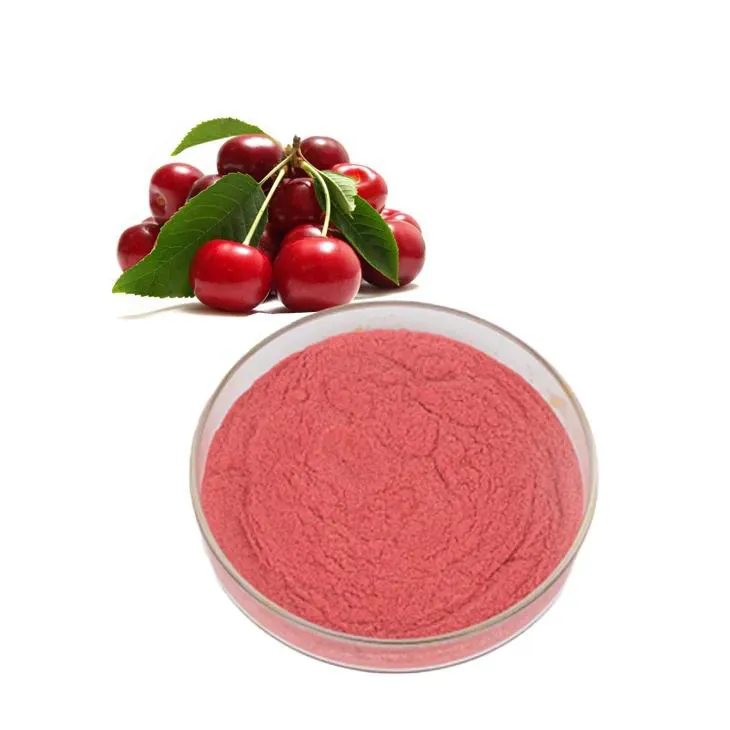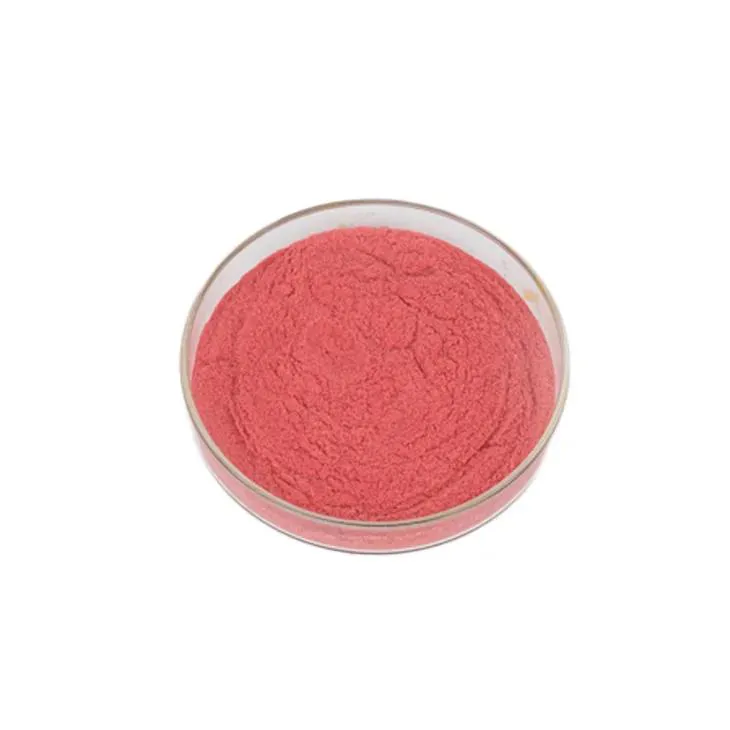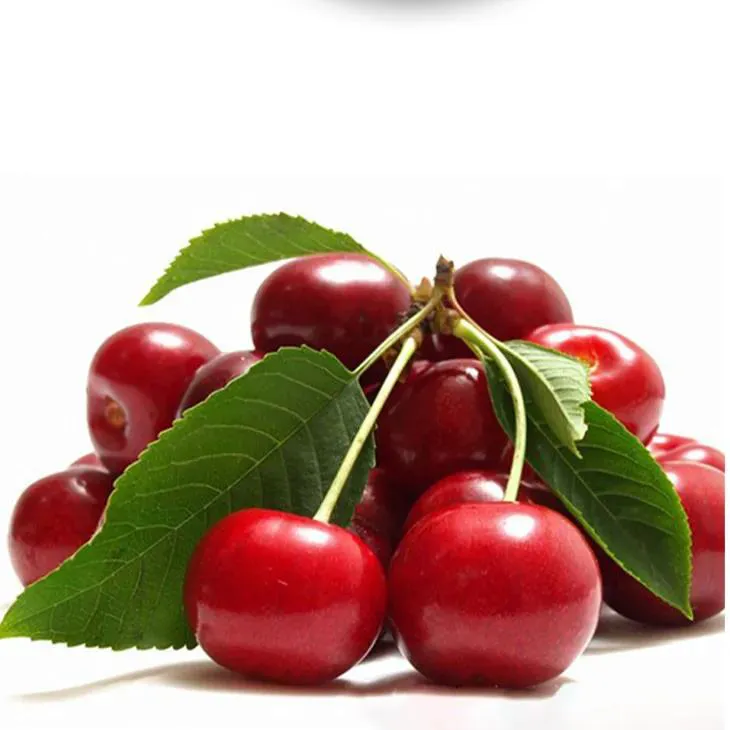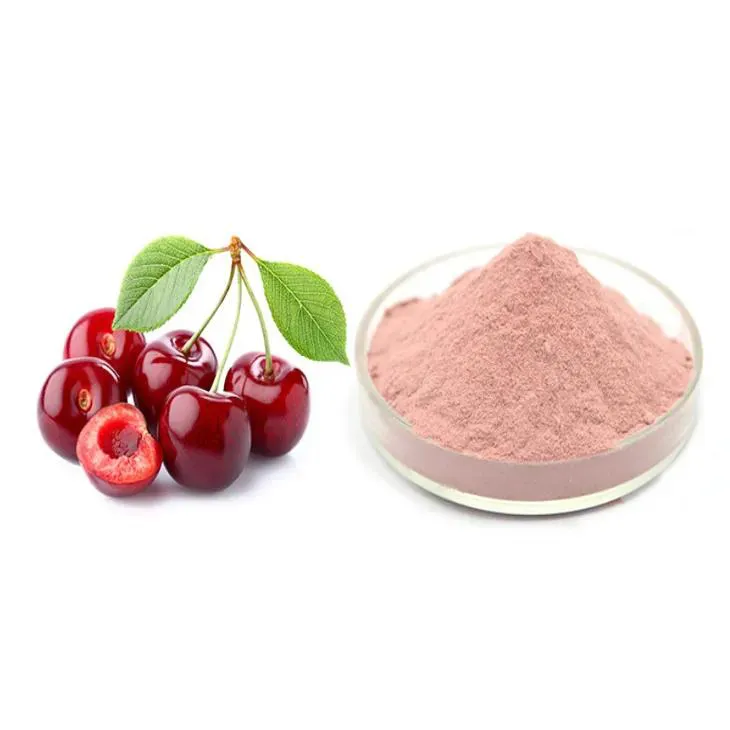- 0086-571-85302990
- sales@greenskybio.com
The flavor of mature acerola juice powder and natural acerola juice powder.
2024-11-12

1. Introduction
Acerola, also known as Barbados cherry, is a small, bright red fruit that is rich in nutrients. Acerola Juice Powder, both in its mature and natural forms, has been gaining popularity in the market due to its potential health benefits. However, there are distinct differences between mature Acerola Juice Powder flavor and natural Acerola Juice Powder in various aspects such as taste, origin, extraction process, and health benefits. Understanding these differences is crucial for consumers and relevant industries.

2. Taste
2.1 Natural Acerola Juice Powder
The taste of natural acerola juice powder is often described as tart and fruity. It has a relatively pure and straightforward flavor that closely resembles the taste of fresh acerola fruits. The tartness is a prominent characteristic, which gives it a refreshing and tangy sensation on the palate. Since it is minimally processed, it retains much of the original flavor profile of the acerola fruit. For those who enjoy a more natural and unadulterated fruit taste, natural acerola juice powder can be a great choice.
2.2 Mature Acerola Juice Powder Flavor
Mature acerola juice powder flavor, on the other hand, may have a more complex taste. It still retains some of the tartness of the natural fruit, but it can also have additional flavor notes. As the acerola matures, its chemical composition changes slightly, which can result in a flavor that is perhaps a bit more mellow compared to the natural juice powder. There may be a hint of sweetness that develops as the fruit matures, which can balance out the tartness to some extent. Additionally, during the processing of mature acerola juice powder, certain flavor - enhancing techniques or additives may be used in some cases (although this is not always the case), which can further modify the taste.

3. Origin
3.1 Natural Acerola
Natural acerola is typically sourced from regions where the acerola tree thrives natively. Acerola is native to tropical and subtropical regions such as South America, Central America, and the Caribbean. In these areas, the climate is warm and humid, which is ideal for the growth of acerola trees. For example, in Brazil, large - scale cultivation of acerola takes place. The natural acerola used for juice powder production is often harvested from these regions, ensuring a pure and natural origin. The quality of the natural acerola can be highly influenced by the local soil conditions, sunlight exposure, and rainfall patterns in these native regions.
3.2 Mature Acerola
Mature acerola also has its origin in these same general regions. However, the harvesting of mature acerola may be more selective. Growers may wait until the acerola has reached a specific stage of maturity before harvesting for juice powder production. This may involve different cultivation and management practices compared to harvesting for natural acerola juice powder. In some cases, more advanced agricultural techniques may be used to ensure the optimal maturity of the acerola. For instance, controlled irrigation and fertilization methods can be employed to promote the proper growth and maturation of the fruit.

4. Extraction Process
4.1 Natural Acerola Juice Powder Extraction
The extraction process for natural acerola juice powder is relatively simple and aims to preserve the natural characteristics of the fruit. First, fresh acerola fruits are carefully harvested. Then, they are washed thoroughly to remove any dirt or impurities. After that, the fruits are usually crushed or juiced mechanically to obtain the raw acerola juice. This juice may then be filtered to remove any solid particles such as pulp or seeds. Next, the juice is dehydrated, often through processes like spray - drying or freeze - drying. Spray - drying involves spraying the juice into a hot - air chamber where the water evaporates quickly, leaving behind the powder. Freeze - drying involves freezing the juice first and then removing the water in a vacuum chamber. These methods help to retain the natural flavor and nutrients of the acerola as much as possible.
4.2 Mature Acerola Juice Powder Extraction
For mature acerola juice powder extraction, the process may start with a more careful selection of the mature fruits. Once harvested, similar initial steps such as washing are carried out. However, the extraction process may be adjusted to account for the differences in the mature fruit. For example, the crushing or juicing process may be optimized to extract the maximum amount of juice from the mature acerola. In some cases, enzymatic treatments may be used to break down the cell walls of the mature fruit more effectively, which can increase the yield of the juice. After obtaining the juice, the same dehydration methods like spray - drying or freeze - drying may be used. But in some industrial processes for mature acerola juice powder, additional steps may be involved, such as purification steps to remove any unwanted substances that may have developed during the maturation process of the fruit.

5. Health Benefits
5.1 Natural Acerola Juice Powder Health Benefits
Natural acerola juice powder is a rich source of vitamin C. In fact, acerola is known to have one of the highest vitamin C contents among fruits. Vitamin C is an essential nutrient that plays a crucial role in the immune system, helping the body to fight off infections and diseases. It also acts as an antioxidant, protecting the body's cells from damage caused by free radicals. Additionally, natural acerola juice powder may contain other nutrients such as vitamin A, B - vitamins, and minerals like potassium and magnesium. These nutrients contribute to overall health, for example, vitamin A is important for vision, and potassium is essential for maintaining proper heart function and fluid balance in the body.
- Boosts the immune system due to its high vitamin C content.
- Provides antioxidant protection.
- Contributes to overall health with other essential nutrients.
5.2 Mature Acerola Juice Powder Health Benefits
Mature acerola juice powder also offers significant health benefits. While it still contains a good amount of vitamin C, the changes in its chemical composition during maturation may lead to the presence of other bioactive compounds. For example, as the acerola matures, there may be an increase in certain phenolic compounds. These phenolic compounds are also antioxidants and can have additional health - promoting effects such as reducing inflammation in the body. Moreover, the more mellow flavor of mature acerola juice powder may make it more palatable for some people, which can encourage regular consumption and thus better utilization of its health benefits.
- Contains vitamin C for immune support and antioxidant activity.
- May have increased phenolic compounds for anti - inflammation.
- Potentially more palatable for regular consumption.
6. Implications for Consumers
For consumers, understanding the differences between mature acerola juice powder flavor and natural acerola juice powder can help them make more informed choices. If a consumer prefers a more tart and pure fruit flavor, natural acerola juice powder may be the preferred option. On the other hand, if a more complex and potentially sweeter flavor is desired, along with the possibility of different health benefits associated with the maturation process, then mature acerola juice powder flavor could be a better choice.
Consumers should also consider the origin of the acerola when making a purchase. Acerola sourced from regions with good environmental conditions and sustainable farming practices may be of higher quality. Additionally, knowing about the extraction process can give consumers an idea of how pure and natural the product is. For example, products that use minimal additives during the extraction process may be more appealing to health - conscious consumers.
7. Implications for Relevant Industries
For the food and beverage industry, the differences between these two types of acerola juice powder can be used to develop a wider range of products. For instance, natural acerola juice powder can be used in products that target consumers who prefer a more natural and pure taste, such as in some high - end health drinks or as an ingredient in natural - flavored desserts. Mature acerola juice powder flavor, with its more complex taste, can be incorporated into products where a more nuanced flavor profile is desired, such as in some specialty cocktails or in gourmet food products.
The pharmaceutical and nutraceutical industries can also benefit from understanding these differences. Depending on the specific health benefits associated with each type of acerola juice powder, they can develop targeted supplements. For example, natural acerola juice powder can be used in basic vitamin C supplements, while mature acerola juice powder may be used in products aimed at reducing inflammation or for more specialized health needs.
8. Conclusion
In conclusion, both mature acerola juice powder flavor and natural acerola juice powder have their own unique characteristics in terms of taste, origin, extraction process, and health benefits. These differences are important for consumers to consider when choosing which product to purchase, and for relevant industries to develop products that meet the diverse needs of the market. By understanding these aspects, consumers can make choices that align with their taste preferences and health goals, and industries can capitalize on the distinct features of each type of acerola juice powder to create innovative and appealing products.
FAQ:
Q1: What are the main differences in taste between mature acerola juice powder and natural acerola juice powder?
Mature acerola juice powder may have a more intense and complex flavor. As the fruit matures, the flavor compounds develop further. It might have a deeper, richer taste with potentially more pronounced fruity and slightly tangy notes. Natural acerola juice powder, on the other hand, has a relatively fresh and pure acerola flavor, which is more straightforward and closer to the taste of freshly squeezed acerola juice.
Q2: How do the origins of mature acerola juice powder and natural acerola juice powder differ?
Both types of acerola juice powder ultimately originate from the acerola fruit. However, the term mature" implies that the fruit used for the mature acerola juice powder is harvested at a later stage of ripeness compared to the fruit used for natural acerola juice powder. Acerola fruits are typically grown in tropical and subtropical regions such as South America, Central America, and the Caribbean. The specific origin of the powder depends on where the acerola fruits are sourced from in these regions, but the key difference is the stage of fruit maturity at harvest.
Q3: What are the differences in the extraction processes of mature acerola juice powder and natural acerola juice powder?
For natural acerola juice powder, the extraction process usually aims to preserve the most natural state of the juice. It often involves simple steps like washing the fresh acerola fruits, squeezing out the juice, and then drying the juice carefully to form powder while trying to minimize the addition of other substances. For mature acerola juice powder, due to the different properties of mature fruits, there may be additional steps in the extraction process. For example, the mature fruits may require different handling to deal with the more complex flavor and texture components. There might be specific enzymatic treatments or filtration methods to optimize the extraction of the unique flavor and nutrient components associated with mature fruits.
Q4: Are there different health benefits between mature acerola juice powder and natural acerola juice powder?
Both types of acerola juice powder offer significant health benefits. Acerola is rich in vitamin C, antioxidants, and other nutrients. Natural acerola juice powder provides a straightforward source of these nutrients in a more "pure" form as it is closer to the original state of the fruit. Mature acerola juice powder, with its potentially different nutrient composition due to the maturity of the fruit, may also offer unique health benefits. For example, the more developed flavor compounds in mature fruits might be associated with certain antioxidant properties that are different from those in less - mature fruits. However, more research is needed to fully understand and quantify these differences.
Q5: Which one is more suitable for different consumer groups, mature acerola juice powder or natural acerola juice powder?
For consumers who prefer a more intense and complex flavor, mature acerola juice powder might be a better choice. It could be appealing to those who like to experience a deeper and more developed fruity taste. Also, for some who are interested in the potential unique health benefits associated with the more mature fruit state. On the other hand, natural acerola juice powder is ideal for consumers who value a pure and fresh taste, similar to freshly squeezed juice. It is also a good option for those who want a more basic and direct source of acerola's nutrients without any potential flavor or nutrient alterations that might come with the processing of mature fruits.
Related literature
- "Acerola Fruit: Composition, Health Benefits, and Industrial Applications"
- "Comparative Analysis of Acerola Juice at Different Maturity Stages"
- "The Nutritional and Flavor Profiles of Acerola - Based Products"
- ▶ Hesperidin
- ▶ Citrus Bioflavonoids
- ▶ Plant Extract
- ▶ lycopene
- ▶ Diosmin
- ▶ Grape seed extract
- ▶ Sea buckthorn Juice Powder
- ▶ Fruit Juice Powder
- ▶ Hops Extract
- ▶ Artichoke Extract
- ▶ Mushroom extract
- ▶ Astaxanthin
- ▶ Green Tea Extract
- ▶ Curcumin
- ▶ Horse Chestnut Extract
- ▶ Other Product
- ▶ Boswellia Serrata Extract
- ▶ Resveratrol
- ▶ Marigold Extract
- ▶ Grape Leaf Extract
- ▶ New Product
- ▶ Aminolevulinic acid
- ▶ Cranberry Extract
- ▶ Red Yeast Rice
- ▶ Red Wine Extract
-
Moringa powder
2024-11-12
-
Epimedium extract powder
2024-11-12
-
Gynostemma pentaphyllum extract
2024-11-12
-
Peppermint Extract Powder
2024-11-12
-
Soy Extract
2024-11-12
-
Lemon Juice Powder
2024-11-12
-
Ginseng Root Extract
2024-11-12
-
Camu Camu Extract
2024-11-12
-
Kupilu Extract
2024-11-12
-
Black Pepper Extract
2024-11-12





















